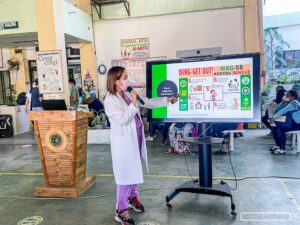The Ilocos Way: Unveiling Best Practices for Dengue Prevention
- Published on March 2, 2024
- by @peoplesbalita
 Dengue, a relentless mosquito-borne disease, has emerged as a formidable global challenge, leaving no corner of the globe untouched. From bustling urban centers to remote rural areas, the impact of dengue is felt far and wide, as it continues to spread its insidious grip.
Dengue, a relentless mosquito-borne disease, has emerged as a formidable global challenge, leaving no corner of the globe untouched. From bustling urban centers to remote rural areas, the impact of dengue is felt far and wide, as it continues to spread its insidious grip.
On a global scale, the World Health Organization (WHO) has identified a staggering 3.9 billion individuals at risk of contracting dengue, a mosquito-borne viral infection. This disease has established its prevalence in 129 countries, with the Americas, Southeast Asia, and Western Pacific regions shouldering the highest burden. In the Southeast Asian region, the Philippines has been continuously experiencing an alarming surge in dengue cases.From January 2023 to January 2024, the country reported the highest number of cases in Southeast Asia, surpassing 195,000, tragically resulting in 657 deaths.
Recognizing the urgency of addressing the burden of dengue disease, the Department of Health (DOH) emphasizes the importance of implementing extensive prevention measures. As part of a comprehensive dengue awareness campaign, the Philippine Pediatric Society Northern Luzon Chapter has been organizing lecture programs nationwide. These programs bring together medical experts who discuss effective dengue prevention strategies.
The initiative is carried out in collaboration with the Ilocos Norte Medical Society and receives support from the Ilocos Norte Provincial Health Office and Takeda Healthcare Philippines, Inc.
Strengthening healthcare programs
The Ilocos region in the Philippines is celebrated for its awe-inspiring landscapes and vibrant culture. What’s even more remarkable is that it has one of the lowest incidence rates of dengue in the entire country.
As part of an ongoing campaign led by the Philippine Pediatric Society Northern Luzon Chapter, in collaboration with the Ilocos Norte Medical Society, the Ilocos Norte Provincial Health Office, and Takeda Healthcare Philippines Inc., a lecture campaign was also organized in Ilocos. In this forum, they shared invaluable best practices to promote preventive measures and effectively manage dengue occurrences within the community.
Ilocos Norte provincial health officer Dr. Rickson Balalio discussed the health programs implemented by the local government to ensure that communities are supported, educated, and empowered to make better healthcare choices. One of these programs is the Capitol Express, an initiative led by Ilocos Norte Governor Matthew Manotoc to deliver a comprehensive, one-stop shop service to the communities.
Dr. Balalio stated, “The Capitol Express has provided invaluable support to thousands of residents, enabling them to access a wide range of government programs and services, including medical and livelihood assistance.”
“So, instead of requiring individuals to personally visit the Capitol to request assistance or access government services, the Capex team has implemented a proactive approach. They have scheduled visits to various villages in Ilocos Norte, ensuring that people are informed about the available programs and services they may benefit from,” he continued.
During Capex scheduled visits, which are often conducted in village halls, schools, public markets, or municipal auditoriums, people would line up at the venue where Capitol workers assist them with an array of specific programs and services being offered.
Meanwhile, in a seperate dengue awareness forum held at Mariano Marcos Memorial Hospital (MMMH), infectious disease expert Dr. Noreen Cala-Malubay, and Dr. Darwin Ranada, representatives of MMMH discussed dengue signs, symptoms, and prevention tips. The local government of Ilocos Norte focused on a proactive healthcare system and on fostering partnerships.
“Dengue is [a threat] all year round. Prevention is important. We conduct lectures and information campaigns to remind the communities about best prevention practices and the 5S program of the DOH,” said Dr. Cala-Malubay. ”
Continuing her statement, she expressed gratitude, saying, “We are fortunate to receive support for all our awareness projects and endeavors. Our goal is to ensure widespread knowledge, reaching our local community and the entire province.”
Strengthening public health
“Dengue is a public health concern in the Philippines. Aside from vector control, the dengue vaccine is an integral part of integrated dengue control. There are newer vaccines with improved vaccine design to elicit an enhanced immune response for the prevention of infection and severe dengue,” said Dr. Arthur Dessi Roman, Vice President of Microbiology and Infectious Disease (PSMID) during his lecture on dengue awareness and prevention.
The WHO’s Strategic Advisory Group of Experts on Immunization (SAGE) recommends considering the use of a live- attenuated tetravalent second-generation dengue vaccine, such as TAK003, for introduction in areas with high dengue disease burden and transmission intensity, particularly for children aged 6 to 16, targeting the age-specific peak incidence of dengue-related hospitalizations, which should be 1- 2 years earlier.
“Communication is key. We need to have a communication strategy to inform the public about the benefits of immunization,” noted Dr. Maria Carmen Nievera, Secretary, Pediatric Infectious Disease Expert and Chief Pediatric Infectious Disease Section of the Asian Hospital and Medical Center. Dr. Nievera also shared that the Committee for Medicinal Products for Human Use (CHMP) of the European Medicines Agency (EMA) and the United Kingdom Medicines and Healthcare Products Regulatory Agency (MHRA) have all recommended the approval of TAK003 for dengue prevention and protection. TAK-003 is available and approved for use in more than 30 countries including Europe, Indonesia, Thailand, and Brazil.
Collaboration plays a pivotal role in safeguarding public health against the threat of dengue. Through fostering alliances, communities can create a comprehensive network dedicated to raising awareness, implementing proactive healthcare programs, and fortifying defense against dengue.
This approach ensures a shared responsibility in the fight against the disease, reinforcing the importance of collective action in preserving and promoting public health.
To learn more about prevention tips and latest health updates on dengue, follow Iwas Dengue on Facebook: https://www.facebook.com/iwasdenguepilipinas or visit http://iwas-dengue.ph
-

SC hinimok ideklarang unconstitutional P125-M transfer sa OVP confidential funds
NAGHAIN ng petisyon sa Korte Suprema ang isang grupo ng mga abogado, atbp. para ideklarang labag sa Saligang Batas ang paglipat ng P125 milyong confidential funds para sa Office of the Vice President. Sa 49-pahinang petisyong isinumite ngayong Martes, inilalaban ngayon ng naturang grupo na maibalik ng OVP ang kontrobersyal na halaga sa […]
-

Parang reunion ng mga nakasama sa loob ng 25 years: DINGDONG, excited nang makapag-shoot sa bagong megaserye na ‘Royal Blood’
PINAKITA na ang cast ng tila bagong megaserye ng GMA na may titulong ‘Royal Blood’. Pinangungunahan ito ni Kapuso Primetime King Dingdong Dantes at ni Mr. Tirso Cruz III. Kasama rin sa malaking cast sina Rhian Ramos, Megan Young, Mikael Daez, Arthur Solinap, Dion Ignacio, Lianne Valentin, Benjie Paras at Miss […]
-
Juico pinamamadali ang Phisgoc report
ISANG mosyon ang isinumite ni Philippine Athletics Track and Field Field Association (PATAFA) president Philip Ella Juico na humihimok sa Phil- ippine Southeast Asian Games Organizing Committee o PHISGOC na ipasa agad ang audited financial report sa pagdaraos ng bansa ng 30th South- east Asian Games noong Disyembre 2019. Ginawa ng opisyal ang hakbang […]
